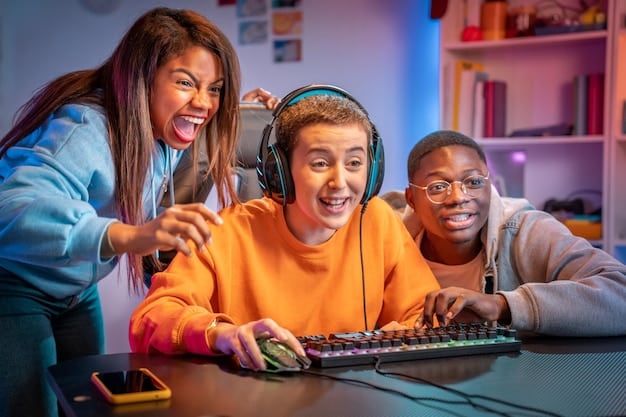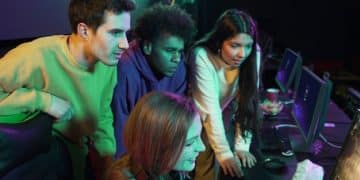US Esports in Education: How Schools Integrate Gaming Curriculum

US esports and education are increasingly intertwined, with schools integrating gaming into their curricula to enhance skills like strategic thinking, teamwork, and problem-solving, while also providing pathways to potential careers in the burgeoning esports industry.
The intersection of US esports and education: How schools are integrating gaming into the curriculum is creating exciting new opportunities for students. Beyond just playing games, schools are recognizing the educational value of esports, fostering skills that are relevant in today’s digital world, it is important to note that the integration of gaming into the curriculum, more than just playing, teaches students valuable future skills.
The Rise of Esports in US Education
Esports, or competitive video gaming, has exploded in popularity globally, and the US is no exception. This surge has naturally extended into the educational sphere, with many schools recognizing the potential benefits of incorporating esports into their programs. The integration of esports into the curriculum marks a new era in education.
Why Esports is Gaining Traction
Esports offers a unique blend of entertainment and skill development. Students participating in esports learn valuable skills, from strategic thinking and quick decision-making to teamwork and communication. It’s a dynamic and engaging way to learn.
- Skill Development: Esports enhances critical thinking, problem-solving, and strategic planning abilities.
- Teamwork and Communication: Competitive gaming requires effective collaboration and coordination among team members.
- Engagement: Esports provide a high level of engagement, motivating students who may not be interested in traditional extracurricular activities.
- Career Pathways: The esports industry is rapidly growing, offering potential career paths in game design, streaming, coaching, and more.
The growing recognition of these benefits is fueling the adoption of esports programs in schools across the US, creating new opportunities for students to excel both academically and personally. Schools recognize the comprehensive skillsets that esports are promoting to participating students.

The Educational Benefits of Gaming
Gaming, often perceived as a recreational activity, offers numerous educational benefits when integrated thoughtfully into the curriculum. These benefits extend beyond mere entertainment, contributing to cognitive development, problem-solving skills, and teamwork.
Esports offer a spectrum of educational benefits when integrated into an optimized curriculum. Understanding these benefits is key to appreciating how gaming can positively influence a student’s comprehensive development.
Cognitive Development
Gaming can enhance cognitive functions such as attention, memory, and spatial reasoning. Complex games require players to process information quickly and make strategic decisions, which can improve overall cognitive agility.
Problem-Solving Skills
Many games require players to solve complex puzzles and overcome challenges through strategic planning and critical thinking. These skills are highly transferable to academic and professional settings. Problem-solving within games increases cognitive flexibility.
- Critical Thinking: Games often require players to analyze situations and make informed decisions.
- Strategic Planning: Planning and executing strategies is a key component of many games.
- Adaptability: Players must adapt to changing circumstances and unexpected challenges.
By leveraging these educational benefits, schools can create a more engaging and effective learning environment, preparing students for success in the 21st century. Educators can harness gaming’s potential for enhanced student outcomes.
How Schools are Implementing Esports Programs
Schools across the US are implementing esports programs in various ways, from extracurricular clubs to integrated curriculum components. These programs aim to provide students with opportunities to compete, collaborate, and develop valuable skills.
Esports Clubs and Teams
Many schools are starting with esports clubs, where students can practice, compete, and build a sense of community around gaming. These clubs often participate in local and national tournaments.
Esports clubs can provide a structured environment for students to pursue their passion for gaming while developing essential skills.
Curriculum Integration
Some schools are taking a more integrated approach by incorporating esports into their curriculum. This might involve using games to teach specific subjects or offering courses on game design and development.
By integrating esports into the curriculum, schools can leverage the engaging nature of gaming to enhance learning outcomes.
- Subject-Specific Integration: Using games to teach math, science, history, or language arts.
- Game Design Courses: Offering courses on game design, development, and programming.
- Esports Management: Teaching students about the business side of esports, including marketing, event planning, and team management.

The integration of esports requires careful planning and consideration, but the potential benefits for students are significant, offering new pathways for engagement and achievement.
Challenges and Considerations
While the integration of esports into education offers many benefits, it also presents several challenges and considerations that schools must address. These challenges include funding, equity, parental concerns, and ensuring a balanced approach.
Addressing these challenges requires careful planning and collaboration among educators, parents, and the community.
Funding and Resources
Establishing and maintaining esports programs can be expensive, requiring investment in gaming equipment, software, and coaching. Schools need to find sustainable funding sources to support these initiatives.
Equity and Accessibility
Ensuring that all students have equal access to esports opportunities is crucial. Schools need to address potential barriers, such as lack of access to technology or training, to ensure that esports programs are inclusive.
Schools should also consider the diverse interests and backgrounds of their students when designing esports programs, offering a variety of games and activities to appeal to a broader audience.
Parental Concerns
Some parents may have concerns about the impact of gaming on their children’s academic performance, social development, or mental health. Schools need to communicate effectively with parents and address these concerns through education and transparency.
- Education: Providing parents with information about the benefits of esports and the skills that students can develop through gaming.
- Transparency: Keeping parents informed about the goals and activities of esports programs.
- Monitoring: Implementing measures to monitor students’ gaming habits and ensure a healthy balance between gaming and other activities.
By proactively addressing these challenges and considerations, schools can create esports programs that are beneficial and inclusive for all students.
Success Stories: Schools Leading the Way
Several schools across the US have successfully integrated esports into their programs, serving as models for others to follow. These schools have demonstrated the potential of esports to enhance student engagement, develop valuable skills, and create new opportunities.
These success stories provide valuable insights and inspiration for other schools looking to integrate esports into their programs.
Exemplary Programs
These successful programs often involve dedicated teachers, supportive administrators, and strong community partnerships.
By learning from these examples, schools can develop effective strategies for integrating esports and maximizing the benefits for their students.
Impact on Students
Students participating in these programs have shown improvements in academic performance, attendance, and social skills. They have also developed a strong sense of community and belonging.
- Academic Performance: Improved grades and test scores.
- Attendance: Increased motivation to attend school.
- Social Skills: Enhanced teamwork, communication, and leadership abilities.
By showcasing these success stories, schools can build support for esports programs and demonstrate the positive impact they can have on students and the community as a whole.
The Future of Esports in Education
The future of esports in education looks promising, with increasing numbers of schools embracing gaming as a valuable tool for learning and development. As the esports industry continues to grow, so too will the opportunities for students to pursue careers in this field.
Esports are likely to become an increasingly integral part of the educational landscape, offering new and innovative ways to engage students and prepare them for the future.
Growing Opportunities
The esports industry is rapidly expanding, creating new career opportunities in game design, streaming, coaching, event management, and more. Schools can play a vital role in preparing students for these careers.
By providing students with the skills and knowledge they need to succeed in the esports industry, schools can help them unlock their full potential and contribute to the growth of this exciting field.
Evolving Curriculum
As esports become more integrated into education, curriculum will likely evolve to incorporate more gaming-related content. This might include courses on game design, esports management, and the social and cultural impact of gaming.
- Game Design: Teaching students the principles of game design, including mechanics, level design, and storytelling.
- Esports Management: Providing students with the skills and knowledge they need to manage esports teams, events, and organizations.
- Social and Cultural Impact: Exploring the social and cultural impact of gaming, including issues such as diversity, equity, and inclusion.
The integration of esports presents a wealth of opportunities to prepare students for the challenges and opportunities of the 21st century and beyond.
| Key Point | Brief Description |
|---|---|
| 🎮 Skill Development | Esports enhances critical thinking, problem-solving, and strategic planning abilities effectively. |
| 🤝 Teamwork | Competitive gaming requires effective teamwork and coordination, improving social skills. |
| 💡 Curriculum Integration | Schools integrate esports into subjects, offering courses in game design and esports management. |
| 💼 Career Pathways | The esports industry offers career paths in game design, streaming, coaching, and event planning. |
Frequently Asked Questions
▼
Integrating esports enhances strategic thinking, teamwork, problem-solving skills, and provides potential career pathways. Incorporating gaming enriches students’ overall educational experience, broadening their skill sets for success.
▼
Schools are addressing concerns by educating parents, ensuring transparency about program goals, and monitoring students’ gaming habits. These measures aim to maintain a healthy balance between gaming and other activities.
▼
Esports programs often include strategy games, multiplayer online battle arenas (MOBAs), and team-based shooters. These games promote teamwork, strategic thinking, and quick decision-making skills among students.
▼
Esports encourage teamwork, communication, and leadership skills. Participating in teams allows students to connect, collaborate, and build a sense of community, enhancing their overall social development and interaction.
▼
Esports offer opportunities across several industries including game design, streaming, coaching, and event management. Providing skills and insight to these potential students allows them unlock their potential and contribute to the growth.
Conclusion
The integration of US esports and education is transforming learning in schools, offering new avenues for student engagement and career preparation. By addressing challenges and embracing opportunities, schools can harness the power of gaming to enhance education and empower students for success in the digital age.





